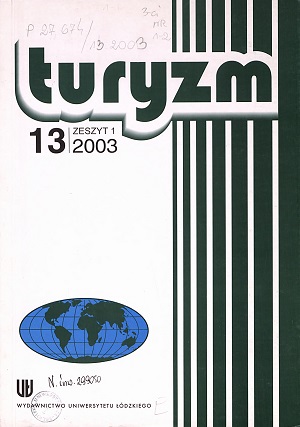The Tourist Region and Globalisation Processes
DOI:
https://doi.org/10.18778/0867-5856.13.1.02Keywords:
region, tourist region, tourism globalisation, multinational corporationsAbstract
The 'tourist region’ has long been a key term in geography and specifically in socio-economic geography. Among the many different types of region there is the tourist region characterised by spatial continuity and difference from surrounding areas. These characteristics however in the age of globalisation are no longer tourist region markers. In the face of tourist globalisation. the concept of a region gains new meaning because present-day tourist regions are largely open (due to international corporations like TUI AG which operate in them), show considerable unification of the tourist product they offer, and are not sufficiently continuous. This means that either the concept of a tourist region is becoming less clear-cut, or that in fact it is slowly losing its meaning.
Downloads
References
Alejziak W., 2000, Turystyka w obliczu wyzwań XXI wieku, Albis, Kraków.
Google Scholar
Bar R., Doliński A., 1974, Geografia turystyczna Polski, Polskie Towarzystwo Ekonomiczne, Warszawa.
Google Scholar
Dela Cruz T., Wolchuk S., 2000, Hotels’ 325, “Hotels”, July, s. 40-86.
Google Scholar
Domański R., 1990, Zasady geografii społeczno-ekonomicznej, PWN, Warszawa-Poznań.
Google Scholar
Dziewoński K., 1957, Niektóre problemy badania regionów gospodarczych w Polsce, „Przegląd Geograficzny", 29, s. 719-739.
Google Scholar
Dziewoński K., 1967, Teoria regionu ekonomicznego, „Przegląd Geograficzny”, nr 39, 1, s. 33-50.
Google Scholar
Gunn C. A., 1994, Tourism planning, Taylor and Francis, Washington, DC.
Google Scholar
Hettner A., 1927, Die Geographie — ihre Geschichte, ihr Wasen und ihre Methoden, Ferdinand Hirt, Breslau.
Google Scholar
Jafari J. (red.), 2001, Encyclopedia of Tourism, Routledge, London-New York.
Google Scholar
DOI: https://doi.org/10.4324/9780203195673
James P. E., Jones C. F., 1954, American geography: inventory and prospect, University of Syracuse Press, Syracuse, N.Y.
Google Scholar
Jędrzejczyk D., 1993, Region ekonomiczny jako system, [w:] D. Jędrzejczyk, W. Kusiński (red.), Studia z historii i metodologii geografii ekonomicznej, Uniwersytet Warszawski, Warszawa, s. 57-78.
Google Scholar
Kowalczyk A., 2001, Geografia hotelarstwa, Wyd. Uniwersytetu Łódzkiego, Łódź.
Google Scholar
Liszewski S., 2002, Przestrzeń turystyczna i osadnictwo turystyczne, [w:] G. Gołembski (red.), Kompendium wiedzy o turystyce, PWN, Warszawa-Poznań, s. 77-109.
Google Scholar
Mileska M. I., 1963, Regiony turystyczne Polski. Stan obecny i potencjalne warunki rozwoju, „Prace Geograficzne”, nr 43.
Google Scholar
Platt R. S., 1935, Field approach to regions, „Annals of the Association of American Geographers”, vol. 25, s. 153-174.
Google Scholar
DOI: https://doi.org/10.1080/00045603509357140
Rykiel Z., 2001, Krytyka teorii regionu społeczno-ekonomicznego, Wyższa Szkoła Finansów i Zarządzania w Białymstoku, Białystok.
Google Scholar
Saprunowa W., 1997, Turizm. Ewolucija. Struktura. Marketing, Os’-89, Moskva.
Google Scholar
Szymczak M. (red.), 1985, Słownik języka polskiego, PWN, Warszawa.
Google Scholar
Warszyńska J., Jackowski A., 1978, Podstawy geografii turyzmu, PWN, Warszawa.
Google Scholar
Whittlesey D., 1954, The regional concept and the regional method, [in:] American Geography: Inventory and Prospect, University of Syracuse Press, Syracuse, N.Y., s. 26-37.
Google Scholar
Wolchuk S., Scoviak Lerner M., 2002, Hotels' 325, July, Special Report www.hotelsmag.com
Google Scholar
Wróbel A., 1965, Pojęcie regionu ekonomicznego a teoria geografii, „Prace Geograficzne”, nr 48.
Google Scholar
Wróbel A., 1967, Pojęcie regionu a metoda regionalna, „Przegląd Geograficzny”, nr 39, 1, s. 73-84.
Google Scholar
www.gnto.gr
Google Scholar
www.tui.com
Google Scholar
Zagółkowa H. (red.), 1997, Praktyczny słownik współczesnej polszczyzny, Wyd. Kurpisz, Poznań, t. 12.
Google Scholar
Downloads
Published
How to Cite
Issue
Section
License

This work is licensed under a Creative Commons Attribution-NonCommercial-NoDerivatives 4.0 International License.










